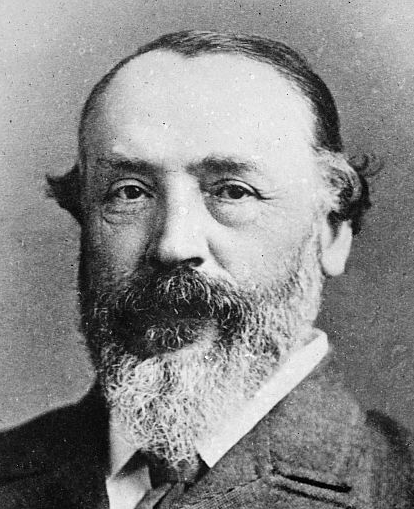
Henry Labouchère
Henry Du Pré Labouchère (9 November 1831 – 15 January 1912) was an English politician, writer, publisher and theatre owner in the Victorian and Edwardian eras. He is now most remembered for the Labouchère Amendment, which for the first time criminalised all male homosexual activity in the United Kingdom.
For his uncle, see Henry Labouchere, 1st Baron Taunton.
Henry Labouchère
writer, publisher and theatre owner
Labouchere Amendment criminalising male homosexual activity
Labouchère, who came from a wealthy Huguenot banking family, was a junior member of the British diplomatic service before briefly serving in Parliament in 1865–68. He lived with the actress Henrietta Hodson from 1868, and they married in 1887. He made a name for himself as a journalist and theatre producer, first buying a stake in The Daily News and in 1876 founding the magazine Truth, which he bankrolled during an extensive series of libel suits.
In 1880, he returned to Parliament as the Liberal member for Northampton, and became a key figure in the radical Home Rule wing of the party. He was a controversial figure, and opposition from Queen Victoria as well as from senior Liberals ensured that he was never given a ministerial position. He became increasingly unpopular because of his opposition to the Second Boer War, and resigned from politics in 1906, when he left Britain and retired to Italy.
Early diplomatic and political career[edit]
While he was in the US, Labouchère (without his prior knowledge) was found a place in the British diplomatic service by his family. Between 1854 and 1864, he served as a minor diplomat in Washington, Munich, Stockholm, Frankfurt, Saint Petersburg, Dresden, and Constantinople. He was, however, not known for his diplomatic demeanour, and acted impudently on occasion.[1] He went too far when he wrote to the Foreign Secretary to refuse a posting offered to him, "I have the honour to acknowledge the receipt of your Lordship's despatch, informing me of my promotion as Second Secretary to Her Majesty's Legation at Buenos Ayres. I beg to state that, if residing at Baden-Baden I can fulfil those duties, I shall be pleased to accept the appointment." He was politely told that there was no further use for his services.[7]
The year after his dismissal, Labouchère was elected at the 1865 general election as a member of parliament (MP) for Windsor,[8] as a Liberal. However, that election was overturned on petition,[1] and in April 1867 he was elected at a by-election as an MP for Middlesex.[9] At the 1868 election he lost the seat by 110 votes.[10] He did not return to the House of Commons for 12 years.[1]
Retirement[edit]
When the Liberal party took power in December 1905, Labouchère was not offered any political office by Henry Campbell-Bannerman, the new prime minister. He was disappointed in this – he had been a strong supporter of Campbell-Bannerman – and retired from Parliament the following month, choosing not to stand at the 1906 general election. His only political reward from the new government was a privy councillorship.[1]
He retired to Florence, where he died seven years later, leaving a fortune of half a million pounds sterling[n 6] to his daughter Dora, who was by then married to Carlo, Marchese di Rudini.[1]